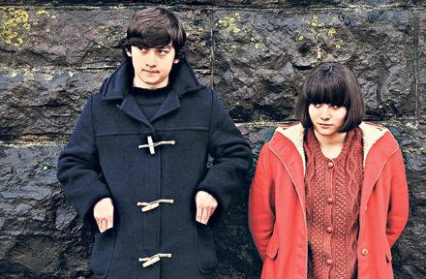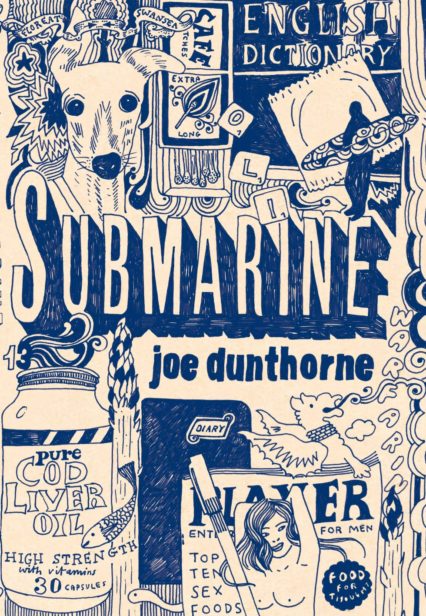Elin Williams extols the pleasures of submerging into the prose of Joe Dunthorne’s popular and film-adapted novel, Submarine, as part of our Greatest Welsh Novel series.
Oliver Tate is, as a teenage protagonist, one of the most believable characters in a teenage fiction novel I have ever come across. In fact, I’d go as far as to say that he is the perfect representation of a fifteen year old boy. Writing a believable teenager as an adult is inevitably difficult, but Joe Dunthorne does it with such skill, it is very difficult to poke holes in the character. He has succeeded in creating a perfect teenager by steering away from the stereotypical and instead engages directly with a younger self.
Written during his BA creative writing course at the University of East Anglia, it is likely that Dunthorne was particularly close to Oliver’s age at the time. Yes, he explores the sexual awakening of the teenage boy, but he also engages with curiosity and a sense of pretentiousness that is typical of an intelligent teenager. Oliver reads the dictionary and thesaurus and begins his diary extracts with a Word of the Day. He is also meticulous about grammar and constantly corrects his peers. The book follows Oliver as he experiences his first sexual encounter with bad girl Jordana Bevan, a passionate teenage affair which ends in tragedy. He becomes obsessed with his parents marriage, becoming convinced that his mother is having an affair with Graham, an old boyfriend of hers. Desperate for his parents to reconcile, he keeps close tabs on his depressive father and breaks into Graham’s Gower cottage in an attempt to convince him that he is deranged and capable of anything. Oliver’s life is full of ups and downs, from listening to his mother pleasure Graham sexually in a tent to deciding to feed rat poison to Jordana’s dog in order to prepare her for the death of her mother, Oliver experiences a roller coaster of emotions which all contribute to his development into the man he will one day become.
The book is inherently Welsh purely because it is written so convincingly from a teenage perspective. There is no striving to create a sense of place; Oliver lives in Swansea and so quite simply we see Swansea from his own disinterested view. Colloquialism occurs naturally (being brought up twenty miles from Swansea, the novel is a home from home for me personally).
Oliver’s character is extremely well-developed, and one reason for this is that there is no censor. Oliver shares every repressed memory, a few which are quite shocking to read. Dunthorne explores every awkward angle; he doesn’t shy away from anything. This is quite rare in not only teenage fiction but fiction in general. Dunthorne explores character in the same way Stephen King does, and despite what your opinion may be on King, he is undoubtedly a master of character. Considering that this was initially Dunthorne’s creative project in university, the skill he displays so early on in learning the craft is very impressive. Oliver is flawed. He’s intelligent, neurotic, paranoid, delusional, well-read, funny and pretentious. It is the character that makes the book such a success. Oliver’s character is so big, it dominates the novel.
Dunthorne’s novel was made into a film, and rightly so; it is perfect for the alternative cinema screen. In fact, the reason I read the book initially was because the film was so fantastic, and I was thrilled to be able to expand on Oliver’s antics in the novel.Directed by Richard Ayoade and starring Craig Roberts as Oliver Tate, the film is a hilarious and mostly accurate portrayal of Oliver’s life. The film was shot on location in and around Swansea and the magnificent Paddy Considine stars as Graham Purvis. Capturing Oliver’s sense of generic individuality through camera shots is very well executed and the fantastic cast are perfect in their portrayals. Of course, alternative or not, in true ‘Hollywood’ style the film ends with Oliver and Jordana. The book is not so optimistic. (I should have alerted you to that spoiler before hand – apologies.) Again, this is a sign of a good book for me. When books end on a pessimistic note it is more realistic. The fact that this novel adhered to this just solidified its greatness.
Although perhaps not considered as one of the greats of Welsh literature, I would argue Submarine is deservedly one of the Greatest Welsh Novels, simply because it just is Welsh. Dunthorne’s writing is engaging and well-crafted. Tate is one of the most believable Welsh protagonists I have come across; full of flaws and full of himself.
This piece is part of Wales Arts Review’s ‘Greatest Welsh Novel‘ series.
Elin Williams has written a number of reviews for Wales Arts Review.













